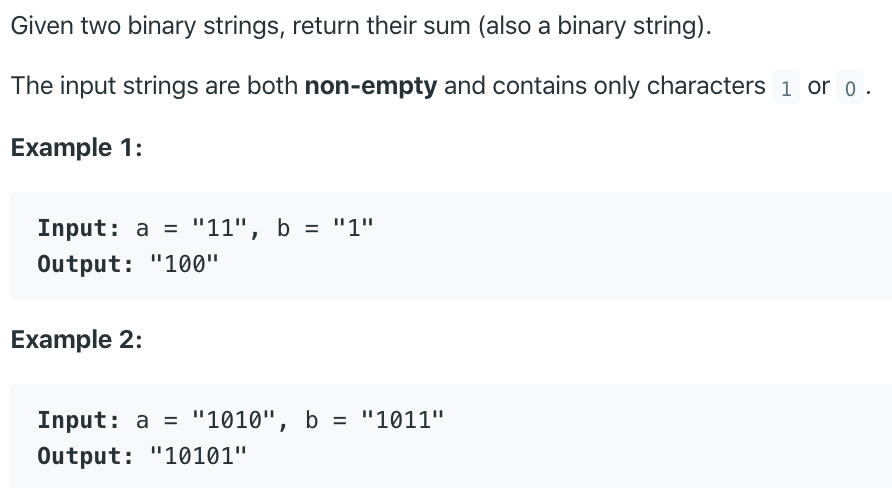Add Binary
franklinqin0 MathString

# Solution
Let be the length of a and be the length of b.
# Convert to Int (trivial)
Use the built-in functions int to convert and format/f-strings (opens new window) to return a string.
Using format function:
def addBinary(self, a: str, b: str) -> str:
return '{0:b}'.format(int(a, 2) + int(b, 2))
1
2
2
Using f-strings:
def addBinary(self, a: str, b: str) -> str:
return f'{int(a,2)+int(b,2):b}'
1
2
2
# RCA (Ripple Carry Adder)
Complexity
time:
space:
def addBinary(self, a: str, b: str) -> str:
n = max(len(a), len(b))
a, b = a.zfill(n), b.zfill(n)
carry = 0
answer = []
for i in reversed(range(n)):
if a[i] == '1':
carry += 1
if b[i] == '1':
carry += 1
if carry % 2 == 1:
answer.append('1')
else:
answer.append('0')
carry //= 2
if carry == 1:
answer.append('1')
answer.reverse()
return ''.join(answer)
1
2
3
4
5
6
7
8
9
10
11
12
13
14
15
16
17
18
19
20
21
22
23
24
2
3
4
5
6
7
8
9
10
11
12
13
14
15
16
17
18
19
20
21
22
23
24
# Bit Manipulation
This solution requires previous knowledge, or supreme ingenuity.
Use x to store the sum (XOR of 2 binaries) and y to store the carry (AND of 2 binaries and left shifted by 1). Keep doing this until carry is 0.
Complexity
time:
space:
def addBinary(self, a: str, b: str) -> str:
x, y = int(a, 2), int(b, 2)
while y:
answer = x ^ y
carry = (x & y) << 1
x, y = answer, carry
return bin(x)[2:]
1
2
3
4
5
6
7
2
3
4
5
6
7
An equivalent but even shorter solution is to replace the while loop content with:
x, y = x ^ y, (x & y) << 1
1